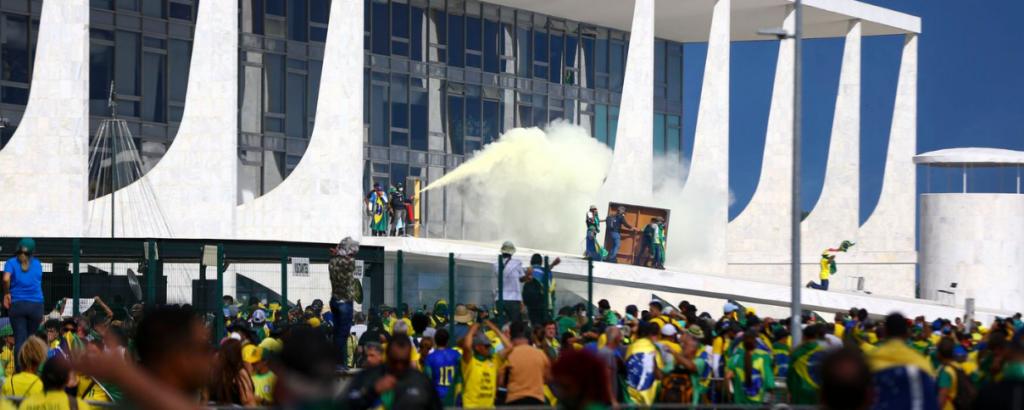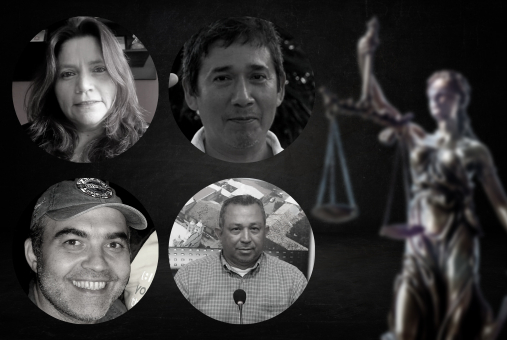In 2023, LatAm Journalism Review (LJR) published more than 250 texts, including stories, interviews and event coverage on urgent topics for journalism such as artificial intelligence, the climate emergency and violence against journalists, especially women. There were, on average, 20 texts per month, produced by the digital magazine's permanent team and collaborators, offering a Latin American perspective to debates on innovation in journalism and press freedom.
Just as we did at the end of last year, each LJR reporter compiled their own 2023 retrospective, selecting their own stories and one written by a colleague that they considered most memorable. We also list some of the articles that most captivated our audience and were among the most read of the year.
Among my articles, I’m highlighting the story “Unprecedented lawsuit threatens to shut down far right radio in Brazil, reigniting free speech discussion.” On countless occasions, Jovem Pan commentators have more or less explicitly encouraged military intervention or a revolution in the country. For example, one of the radio analysts advocated the outbreak of a civil war, while another stated that “the only way to restore order is through chaos.” Keep in mind that supporters of former Brazilian President Jair Bolsonaro invaded Congress, the Supreme Court and Presidential Palace on Jan. 8, 2023.

Supporters of Jair Bolsonaro invading Brazil's Presidential Palace on Jan. 8, 2023. (Photo: Marcelo Camargo/Agência Brasil)
How should the courts react to this? How do we combine the need for plurality and freedom of expression – crucial in any democracy – with a minimum of accountability on the part of communicators? Can a public concession be used to make propaganda for an undemocratic seizure of power? According to the experts consulted, in the Brazilian case, the answer to the last question is no: there is legislation in the country that explicitly prohibits this. A sentence on the case, however, has not yet been proclaimed, and the discussion remains open.
As for the articles I most enjoyed reading, I recommend the article “Closure of radio stations in Venezuela continues as news deserts grow”, by my colleague Katherine Pennacchio. The stories describe the accumulation of challenges to which Venezuelan journalists are subjected, with the closure of dozens of radio stations that have been on the air for decades and the growth of zones of silence.
The growth of these news deserts becomes especially worrying when we know that elections are scheduled for 2024, and that the opposition has decided to run and has organized itself to do so. As several actions – including the repression of the press, but also the arrest of oppositionists – demonstrate, the Maduro government is stifling dissent. How does the press function in this context? Pennacchio's story gives some indications of answers to these questions, without there being any reason for optimism.
Among all the excellent articles that my colleagues wrote in 2023, the one that struck me the most was “Exhibition 'Chile, 1973' presents the first days of the Pinochet dictatorship through the eyes of Brazilian photojournalist Evandro Teixeira.” My colleague André Duchiade had the privilege of speaking personally with the legendary Brazilian photojournalist and reported this conversation in a delightful text, filled with stories of Teixeira's risky and exceptional coverage of post-coup Chile. After reading the text, I had the chance to see the exhibition that brought together 160 photos taken by Teixeira in Chile and Brazil under military dictatorships that were enemies of journalism and freedoms of the press and expression. I can attest that, as André wrote, the exhibition highlighted “the importance of photojournalism for historical documentation” and highlighted “the power of a photographer’s courage and tenacity when backed by a strong and well-structured newspaper”.

Ecuadorian journalist Karol Noroña. (Photo: Karen Toro)
When revisiting the articles I wrote in 2023, I was happy to remember the conversations I had with journalists committed to their jobs and people’s right to information. Not all of these conversations were joyful, however; Many dealt with the violence faced by journalists covering a region in turmoil, with allegations that organized crime has permeated public institutions and the inability (or unwillingness) of governments to face this onslaught. One of them was with the Ecuadorian journalist Karol Noroña. At just 28 years old, Karol is one of the professionals who had to leave her country due to the violence that exploded in Ecuador in 2023. I told this story in the article “Threats from organized crime and government inaction in Ecuador prompt exile of journalists.” I got emotional several times during my conversation with Karol. “To tell stories in a context of death is precisely to fight to continue telling stories about life,” she told me. Part of our goal at LJR is to help journalists tell their stories, as well as those of their fellow citizens, and to continue protecting democracy.
Breaking news coverage is rare at LJR, due to the characteristics of our publication. However, this year we had to cover an unprecedented event for journalism in Latin America in almost real time: the banishment of 222 political prisoners, including five journalists and media entrepreneurs and two journalism students, who were released from prison in February by Daniel Ortega's regime in Nicaragua and sent on a flight to the United States.

The plane that flew political prisoners from Nicaragua to Washington. (Screenshot/YouTube)
Information was scarce and uncertain due to the secrecy and haste with which the release was carried out. Not even the released political prisoners knew for sure what was happening, much less the journalists who were trying to report the facts.
I managed to speak with Lucía Pineda, a colleague and friend of several of the released journalists, who told me over the phone what she was hearing, almost in real time. Hours after the call, she flew to Washington D.C. to join her colleagues in a touching moment.
Concerning my colleague’s work, I’d like to highlight André Duchiade's interview with Natalia Viana, president of the Digital Journalism Association (Ajor, for its acronym in Portuguese). It addressed in detail the pros and cons of a proposed law in Brazil to regulate social media platforms and make them pay media outlets for the use of their content.
In the interview, Viana proposes the changes that, according to Ajor, should be made to the proposed law to prevent only large media outlets from benefiting. The president of the association also explained the importance of journalists contributing to promoting discussions and thinking about solutions for the sustainability of their profession.
For readers not familiar with the Brazilian context, this interview clarifies relevant details to understand the importance of this kind of law in a country where digital platforms have wreaked havoc on public life and triggered disinformation crises at important moments.
Earlier this year, I wrote about an important, yet sad, issue in the Latin American media sector: job insecurity. “Latin American journalists denounce the precariousness in the profession” was without a doubt my favorite story of the year.

(Canva)
I was able to hear testimonies of journalists who denounced the lack of employment contracts in the profession, the low salaries and the lack of guarantees to practice journalism safely. I also heard stories of those who decided to change their profession. I think it is an issue that affects all journalists in Latin America and I would like to continue writing about it next year and try to cover solutions to the problem.
I would also like to highlight the work of my colleagues at LJR. In September, André Duchiade recalled the journalistic legacy of murdered Ecuadorian presidential candidate Fernando Villavicencio. It was a necessary story for our audience and I value the respectful way in which André wrote it. I only knew about Villavicencio's political life, so it was interesting to read about his journalistic achievements as well.
I also want to applaud the work of my colleague Silvia Higuera, who led the special published in LJR on the occasion of the International Day to End Impunity for Crimes against Journalists, which is celebrated every Nov. 2. I recommend everyone check out the special. One of the main reasons why attacks on journalists continue to occur is that there is no justice and the cases go unpunished. It is important to continue paying attention to this topic.
For this year I would like to highlight the journalistic special on the occasion of the International Day to End Impunity for Crimes against Journalists.

(Photos: Courtesy / Canva)
With the support of the LJR team, we highlighted four cases of violence against journalists in the region which continue to go unpunished despite the years that have passed. Covering the stories of Moisés Sánchez, Gabriel Hernández, Claudia Julieta Duque and Pedro Palma (along with my colleague Carolina de Assis) was undoubtedly a quite demanding exercise with which we sought to prevent their crimes from being forgotten.
And if I may highlight one more, I would like to mention the article that analyzes the judicial case against Guatemalan journalist José Rubén Zamora. Expert voices explained how the charges against him and the trial are allegedly part of a larger network including different powers of the State. They say the purpose is to silence the press and political opponents, as well as persecute and round up judicial operators and lawyers who take on these cases of the media, all in the midst of an election campaign marred by allegations of corruption and irregularities. Although an appeals court overturned the conviction against Zamora, he remains in prison until a new trial is held.
Finally, I would like to invite you to read the article by my colleague André Duchiade that tells how an unprecedented lawsuit in Brazil seeks to remove the far-right radio station Jovem Pan from the air. The argument of the lawsuit has to do with the repeated dissemination of “content that discredited, without evidence, the 2022 electoral process,” among other accusations. The case sparked a very interesting debate around freedoms of expression and the press, as well as regulatory frameworks in the country.
Fellowships, grants and opportunities open to Latin American journalists
Fellowships at research centers and universities in the United States and Europe are among the most coveted experiences in a journalist's career. LJR produced an overview of the main opportunities available to those from Latin America, with positions open to beginners all the way to experienced professionals. Applications are open until February 2024.
Useful artificial intelligence resources for journalists
Panelists from the webinar Generative AI: What journalists need to know about ChatGPT and other tools” shared a list of useful artificial intelligence resources for journalists to explore the advantages of this technology. LJR shared a list with additional information about each tool.
The cases of Brazilian journalist Schirlei Alves and Chilean journalist Felipe Soto Cortés reveal the impact of the criminalization of defamation on press freedom in Latin America. A ruling by the Inter-American Court of Human Rights against Chile points the way to combating the use of criminal law to silence journalists in the region.
Panelists at a Knight Center webinar on ChatGPT in newsrooms suggested experimenting with generative artificial intelligence to understand its scope and limitations, learn how to develop effective prompts, and consider the opportunity to revolutionize the way news is delivered using this new technology.